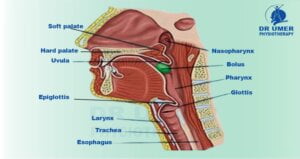What is Dysphagia (Difficulty Swallowing)?
The term Dysphagia means difficulty in swallowing. Difficulty in swallowing also means food is unable to pass through smoothly.
Causes of Dysphagia
Dysphagia usually caused by any other medical disorder like;
If patient have nervous system disorder then difficulty swallowing can occur. Head injury, multiple sclerosis and mouth cancer can also the causes of dysphagia.
Symptoms of Dysphagia
Patient can face different type of symptoms like;
- Patient takes extra time in chewing.
- Difficulty in moving the food and liquid in the mouth.
- Food and liquid goes in the airways during swallowing and it will cause cough.
- Choking of throat
- Recurrent aspiration pneumonia
- Patient always feels that something is stuck in the chest and throat after the swallow.
- Difficulty to sending the food in esophagus.
- Food returns in mouth after swallow.
- Sensation of heart burn.
- Weight loss
How doctor helps you?
When a patient comes with difficulty of swallowing, physical therapist or a doctor ask questions related problem. Most commonly we are facing the following symptoms;
- Odynophagia (means swallowing is painful)
- Reflux and regurgitation (means food or gastric secretions return into the mouth)
- Aspiration (the food or water goes down the trachea rather than the esophagus)
- Gagging (patient feels that vomiting comes because of food)
- Globus pharyngeus (patient feels a lump in the throat)
- Xesrostomia (feeling of dry mouth)

Examination
Normally, a doctor examines the throat first. But the right way to diagnose the difficulty swallowing is to ask the patient to swallow the solid food in-front of doctor.
Risk factors
Greater risk is associated with certain conditions such as stroke and Parkinson’s disease. It can also be dangerous in elderly patients. Patients who have neurological problems may also have difficulty swallowing.
Complications
The common complications are.
- Malnutrition and dehydration; In dysphagia, patient cannot take enough nutrition.
- Aspiration pneumonia; when the patient chewing food, the food entering the airways. It can cause aspiration pneumonia because the food meets bacteria into the lungs.
- Choking; chocking occurs when food stuck in the throat. If the food blocks the airways completely, the patient may die.
Treatment
Treatment depends on the cause of difficulty swallowing. If the cause do-not go away then it will be difficult to cure dysphagia. Physical therapy will be helpful in management of dysphagia.
How Physiotherapy helps you in dysphagia?
Physiotherapist can help you to diagnose the cause of difficulty swallowing. Dysphagia can appear in all ages, but common it appears in old age. Physiotherapist will plan your treatment according your cause, age and how severe dyphagia is. Physical exercises improve the swallowing physiology in speed or timing. Physical exercises also help to retraining the neuromuscular system. Pushing the muscular system in certain position will resolve neural problem. Physical Therapy also helps to strengthen the muscles.
Prevention
If you are facing difficulties in swallowing so, you should try to eating slowly and chewing your food well. But remember that eating slowly cannot resolve your problem. So, if you are difficulty swallowing in regular basis, you should consult the doctor.


